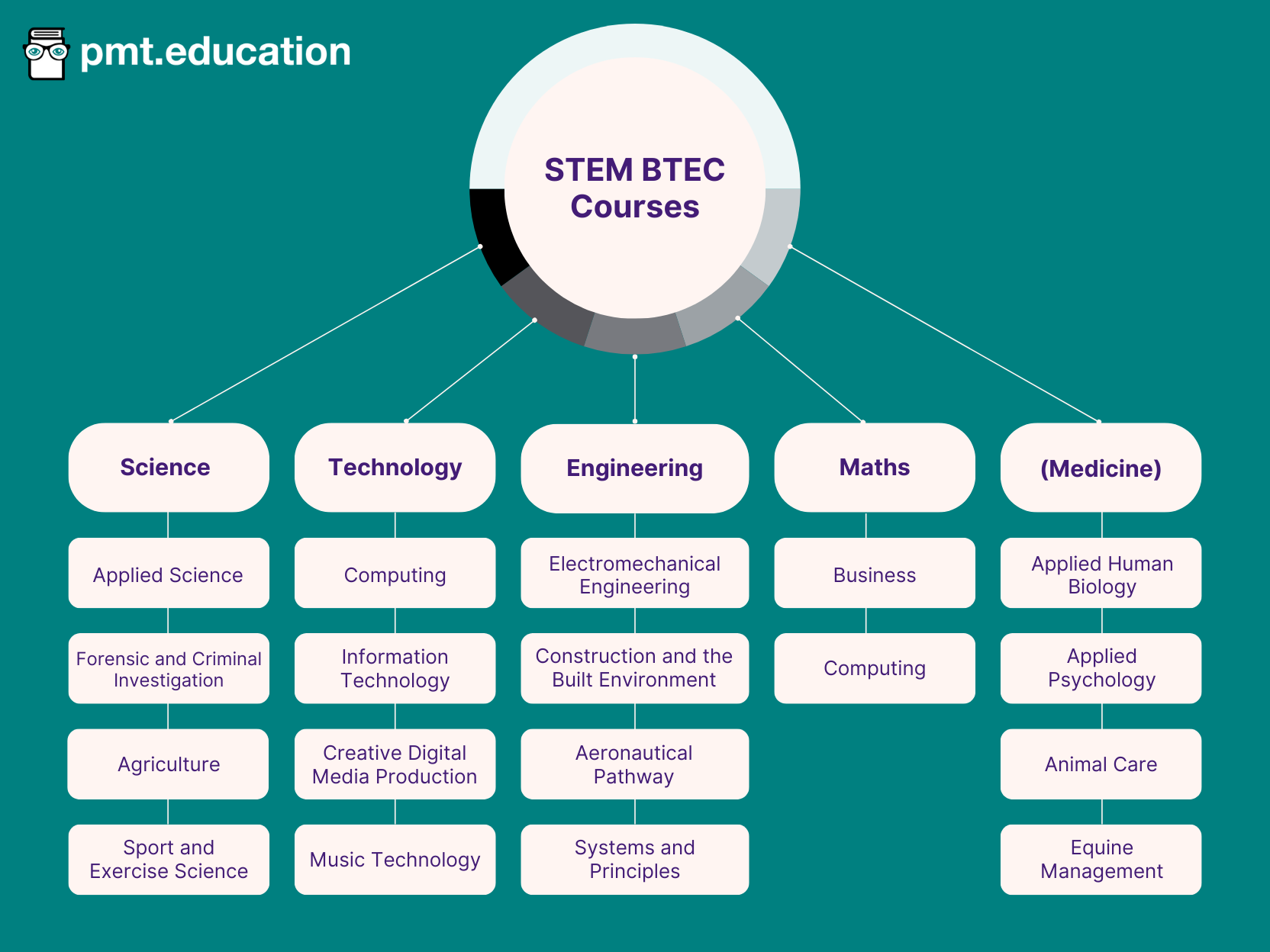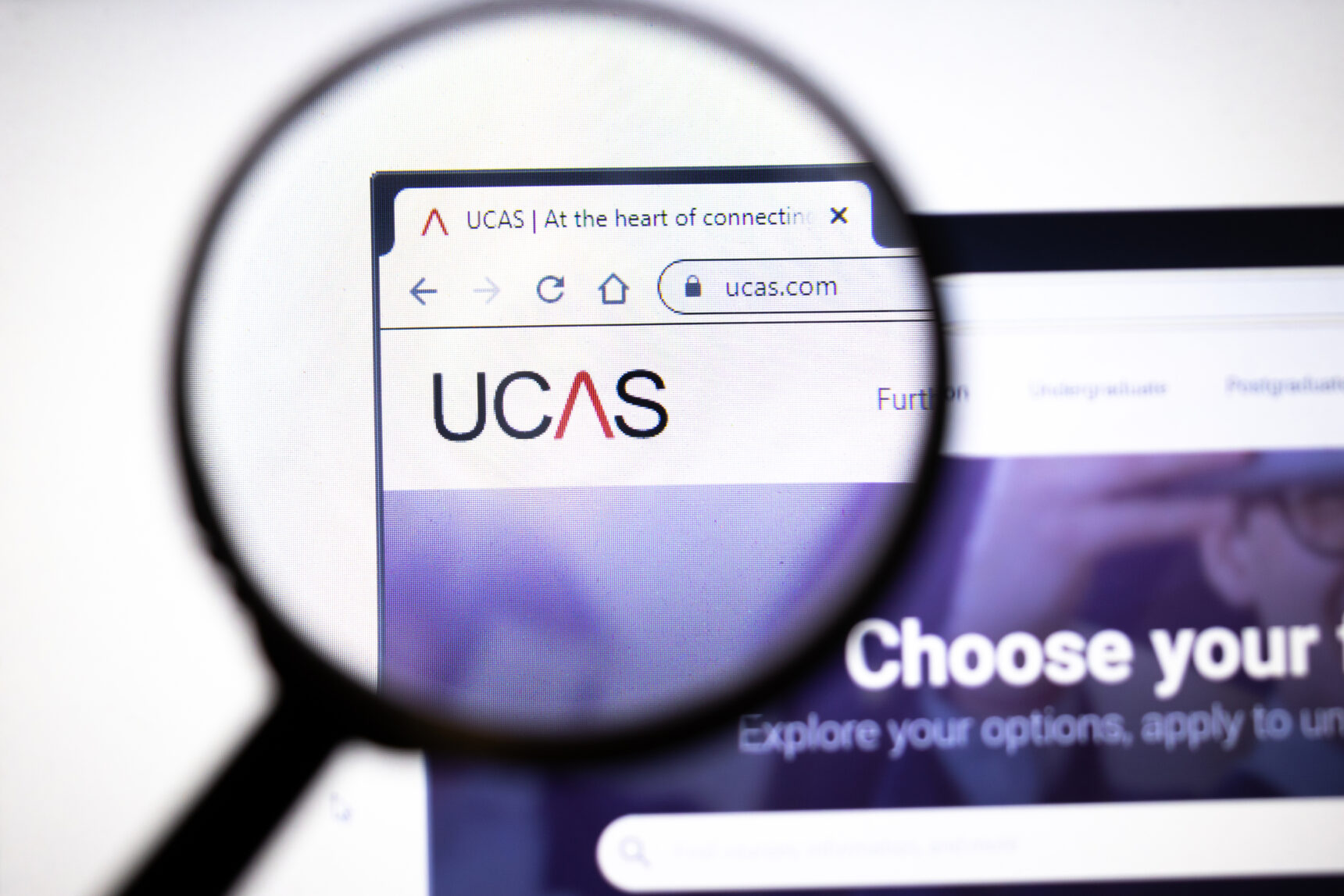Contents:
Qualification Level: Level 2-5
Age Group: 14+ years
Cost: Level 2-3 usually free in state schools. Level 4-5 fees vary with programme and provider.
Skills Developed: Vocational skills, practical knowledge, industry-specific skills
Learning Environment: Classroom-based with practical components
What are BTEC Courses?
BTEC (Business and Technology Education Council) courses are vocational qualifications designed to provide practical, hands-on learning in various fields, including STEM. They’re suitable for students at different educational levels, from Level 2 (GCSE equivalent) to Level 5 (degree equivalent). In this article, we’ll explore what BTEC courses in STEM are all about, how they work, and whether they’re worth pursuing.
What BTEC courses are available in STEM?
A BTEC in STEM is a popular choice, with STEM being well-represented across the 2000 courses spanning 16 sectors. Applied science and IT are the most popular BTEC STEM courses in 2022/23. Other areas like engineering and applied psychology are also seeing an increase in the number of students.
Below, we’ve listed some of the STEM BTECs available:

How do BTEC courses work?
BTECs offer flexibility and a variety of study options. Many students choose to study a BTEC full-time, immersing themselves in their chosen subject. Alternatively, you can combine BTECs with A Levels or do them alongside an apprenticeship, allowing you to gain practical experience while you learn. This versatility means you can find the study style that fits best with your goals and career plans.
What is the structure of a BTEC course?
BTEC courses are structured to combine essential theoretical knowledge with practical skills tailored to your chosen field, ensuring you are well-prepared for both further education and professional careers. Here are some of the key features of BTEC courses:
Core units and optional units
Core units in BTEC courses are designed to build essential practical skills relevant to your field. In STEM-related courses, earlier units focus on foundational knowledge required for later units. For example, all variations of the Applied Science BTEC require students to take “Principles and Applications of Science” and “Practical Scientific Procedures and Techniques”. These core units ensure that you develop a solid understanding of key concepts and skills that are critical for success in your chosen STEM field.
Optional units allow you to delve deeper into specialised topics beyond the core essentials. For instance, in a Forensic and Criminal Investigation BTEC, you can choose modules like “Forensic Fire Investigation” and “Practical Chemical Analysis”. These units explore specific aspects of forensic science, such as arson investigation or detailed chemical analysis, that are not covered in the core curriculum.

The number of core and optional units you take will depend on the specific BTEC programme you choose. To see which units are available in your chosen BTEC, you can view the specification on the Pearson website.
Varied timetables
Most of your time will be spent at your school or college. Your day could include a mix of lectures, masterclasses from guest speakers, and practical workshop sessions (e.g. labs and fieldwork). Even during lectures or classes, the focus is on hands-on learning and practical application, unlike the more theory-heavy approach of GCSEs or A Levels.
You can also expect a flexible timetable that includes more free periods, giving you time to concentrate on your coursework and projects. This setup encourages independent study and allows you to apply what you learn in real-world scenarios, preparing you for your future career.
Learning aligned with your chosen industry
Everything you learn in a BTEC is grounded in real-world professional practices. They follow National Occupational Standards, which ensure you’re learning skills that are directly useful in your chosen industry. You will put these skills into practice through assignments and projects, providing you with a practical understanding of how things work in real workplaces.
Work experience
Many BTECs include work placements, where you spend time gaining experience in a relevant job. This gives you the chance to learn directly from professionals and receive feedback from employers. Some BTEC courses make these placements mandatory, while others strongly recommend them.
Your school or college will encourage “employer involvement for every learner”, which goes beyond placements. This could involve collaborative projects with industry experts or inviting professionals to give masterclasses and lectures. For details on the amount of work experience included in your course, you can refer to Pearson’s 2023/24 guide.

How are BTEC courses assessed?
Unlike A Levels and apprenticeships, which are predominantly examined through final assessments, BTECs are assessed continuously throughout the course. Each unit has its own assignment, typically set and marked by your teacher or course tutor. Some tests, however, may be externally marked. This continuous assessment approach allows you to demonstrate your knowledge and skills progressively, providing a more comprehensive evaluation of your capabilities throughout the course.
Assessments in BTEC courses can vary, including written and activity-based tasks such as research projects, essays, investigations, and fieldwork. Sometimes you’ll have practical assessments where you’re observed doing a specific task or demonstrating a skill. Assessments can be individual or team-based, but all are designed to challenge you to combine the theory and practical skills you’ve learned.
Each unit is graded, and these grades combine to give your final course grade. The number of final grades you get depends on the size of your course: Extended Diplomas receive three grades, Diplomas get two, and Extended Certificates and Firsts get one (see below for level explanations).
BTEC qualifications can be graded:
- D* (starred distinction)
- D (distinction)
- M (merit)
- P (pass)
To find out more about how your chosen course is assessed, see the course specifications.
What BTEC level should you take?
BTEC qualifications are split into different levels depending on how advanced they are and how old you have to be to take them (similar to school key stages). It’s important to choose a course that matches your needs.
BTEC Firsts (Level 2) are equivalent to GCSEs. These are for beginners and those needing an introduction to an industry. Generally, there are no eligibility criteria.
BTEC Nationals (Level 3) are equivalent to A Levels. These are the most common BTECs and are widely recognised by colleges and employers. They’re typically taken by 16 to 19-year-olds. To enrol, you usually need 5 GCSE passes, including English and maths.
Level 3 BTECs
Level 3 BTECs are further categorised based on the number of units:
- BTEC National Extended Diploma: Equivalent to 3 A Levels, taken full-time
- BTEC National Diploma: Equivalent to 2 A Levels, usually taken full-time
- BTEC National Extended Certificate: Equivalent to 1 A Level
Less common alternatives:
- BTEC National Certificate: Equivalent to 1 AS Level
- BTEC Foundation Diploma: Often used for art or design courses, or as the first year of an Extended Diploma
BTEC Higher Nationals (Level 4 or 5) are equivalent to the first or second year of an undergraduate degree. You might take these after completing a BTEC National. They can be standalone qualifications or a foundation for a university degree.
BTEC Apprenticeships (Levels 2 to 5) are available in various STEM sectors, allowing you to earn a BTEC qualification as part of an apprenticeship.
While the breadth of options might seem overwhelming, it allows you to tailor your studies to fit your individual needs. A popular option is to take an Extended Certificate or Diploma alongside A Levels, or Firsts alongside GCSEs. This combination provides both academic breadth and practical skills, ensuring a well-rounded education that prepares you for a wide range of future opportunities.
Applying for BTEC courses
BTECs are offered by many institutions, and the application process is similar to that for traditional academic routes. While BTEC Firsts usually just require you to join the school, post-16 BTEC courses have their own application processes. Whether you’re staying at your current school or transferring to a new institution, here’s how to apply for a BTEC.
Applying through your school
If your school offers BTECs, use the same application process they have for post-16 options. If you’re unsure about the procedure, talk to your tutor, teacher, or careers advisor for guidance.
Changing schools
If you’re considering transferring to a new school or college for your BTEC, you’ll need to find out their specific application process. This usually involves the following steps:
- Research and attend open days: Visit open days at local sixth forms and colleges that offer BTECs. This will give you a chance to see the facilities, meet the teachers, and ask questions about the courses they offer. Not sure what to ask? Read below: factors to consider when applying for BTEC courses.
- Application form: Complete the application form for the new institution. You’ll need to provide your GCSE results and indicate your preferred BTEC options (Extended Certificate, Diploma, or Extended Diploma). Some institutions may ask you to rank your choices in order of preference.
- Interviews and assessments: This is typically for higher level BTECs (4 and 5), although some schools or colleges may require an interview or assessment as part of the application process. This helps them understand your interests and ensure you’re well-suited for the course.
- Offers and acceptance: After reviewing your application, the institution will send you an offer if you meet their criteria. Once you receive an offer, you’ll need to accept it to secure your place.

Returning to education
If you’re returning to education to complete a BTEC, you can apply to further education colleges. BTECs are also offered by some community centres, city councils, academies, and private training providers. The application process is similar to that of changing schools. Check out this list of free BTEC providers in your local area.
Seeking guidance
Don’t hesitate to ask for help from teachers, tutors or career advisors if you have any questions or need assistance with your application.
Factors to consider when applying for BTEC courses
Curriculum and content
- What is the breakdown of the course content? How much of it is practical versus theoretical?
- Does the course involve work experience placements?
- How will you be assessed throughout the course? Are there written exams, practical assessments, or coursework?
BTEC type
- Is it the correct level of BTEC (Level 3 if you’re looking for post-16 options)?
- Do they offer an Extended Certificate, Diploma, or Extended Diploma?
Flexibility
- How many optional units are there compared to core units?
- Are you able to take an A Level alongside your BTEC?
Career and further education
- What pathways are available after completing the BTEC?
- Can you progress into higher education or directly into employment?
Entry requirements
- What are the entry requirements for the course? These are typically lower than A Level and a pass at GCSE in English and Maths is often required, but you should ask the provider for specifics.
College, school or institution’s reputation
- How have they performed in terms of getting students into higher education or employment?
- Are there strong links with local businesses and employers who can offer work placements?
- Has the school or college seen several cohorts through the course already, or is this their first time offering the qualification?
Recognition of BTEC courses
While recognition of BTECs can vary among higher education institutions and employers, many top employers and universities do accept them. The diverse curriculum allows you to pursue a wide range of degrees and careers. However, some courses and employers may have specific pathway or unit requirements, so it’s crucial to check the specific entry requirements.
Do universities accept BTECs?
Yes, around 95% of UK universities and colleges accept BTECs for certain courses, offering many options for BTEC holders. Many courses explicitly list BTECs in their entry requirements, while others require a certain number of UCAS Tariff Points.
The points vary based on the BTEC type and grade. For example, an Extended Diploma with D*D*D* earns 168 tariff points, equivalent to 3 A*s at A Level, whereas PPP translates to 48 points or 3 Es. You can use the UCAS tariff points calculator to determine how many points your BTEC qualification could secure.

Some courses, particularly traditional STEM subjects, may have stricter requirements regarding Level 3 qualifications and subjects studied. If you don’t meet these, consider starting with a foundation degree. BTECs are also excellent preparation for degrees that include an industrial placement year, which involves a work placement or internship.
To pursue certain courses such as veterinary or medical science, you might need to do specific work experience or take an aptitude test like the UCAT. Thoroughly research your desired degree to ensure you’re well-prepared.
Pearson has published case studies for BTEC students wanting to progress into higher education, demonstrating the different routes you can take after studying courses like applied science and IT.
Top tip
If it’s unclear whether your BTEC qualifications meet the entry requirements for a university course, directly contact the university to ask.
Do employers recognise BTECs?
BTECs are highly valued by employers due to their emphasis on practical experience. Many students choose BTECs specifically to start careers in STEM fields. These qualifications often include units on employability skills, helping you become a well-rounded candidate.
Completing a BTEC can also lead to further vocational qualifications or professional development opportunities. The emphasis on work experience provides opportunities to connect with professionals and transition smoothly into employment. If you have a specific job in mind, consider reaching out to a professional in that field, an employer, or your career advisor to determine if a BTEC is the right choice.
BTECs vs other vocational qualifications
T Levels, BTECs, apprenticeships, and NVQs are all vocational qualifications that involve dividing time between a training provider and a workplace. They focus on teaching specific skills, trades, or jobs while supporting your education. But what sets them apart? Fortunately, we have an article to help you easily understand and navigate these various vocational alternatives to A Levels.
BTEC courses provide a practical, hands-on approach to learning, especially in STEM fields. They offer flexibility, making them a great choice for students looking to combine vocational skills with academic study.
Recognised by employers and universities, BTECs can open doors to both higher education and career opportunities. With their focus on real-world experience, they are ideal for those seeking a more applied learning path.
FAQs
What does BTEC stand for?
BTEC stands for Business and Technology Education Council. It represents vocational qualifications focused on practical skills in various fields.
What are BTEC courses equivalent to?
BTEC courses are equivalent to various levels of traditional academic qualifications. For example, a BTEC Level 3 Extended Diploma is roughly equivalent to three A Levels, while a BTEC First is similar to a GCSE.
BTEC Nationals vs A Levels: Which course is right for me?
Choosing between BTEC Nationals and A Levels depends on your learning style and career aspirations. BTEC Nationals are ideal for students who prefer practical, hands-on experience and want to develop specific career skills through continuous assessment and real-world projects. They are well-suited for vocational pathways.
In contrast, A Levels offer a more traditional academic education with a focus on theoretical knowledge and are primarily assessed through final exams. They are suitable for students aiming for a broad academic foundation and university study.
BTEC Firsts vs GCSEs: Which course is right for me?
BTEC Firsts provide practical, industry-focused learning and are great if you prefer hands-on projects. GCSEs offer a general education with a broad subject range. Note that some GCSEs are essential for further academic or vocational options.
What BTEC level is equivalent to A Level?
A BTEC Level 3 Extended Diploma is considered equivalent to three A Levels, a BTEC National Diploma to two A Levels and a BTEC National Extended Certificate to one A Level.
What BTEC level is equivalent to GCSE?
A BTEC Level 2 First is equivalent to a GCSE.
Are there BTEC online courses?
Yes, there are BTEC online courses available. Many educational institutions and training providers offer BTECs through online platforms, allowing you to complete coursework remotely. This option can be particularly useful if you need flexibility or are unable to attend in-person classes.


Comments